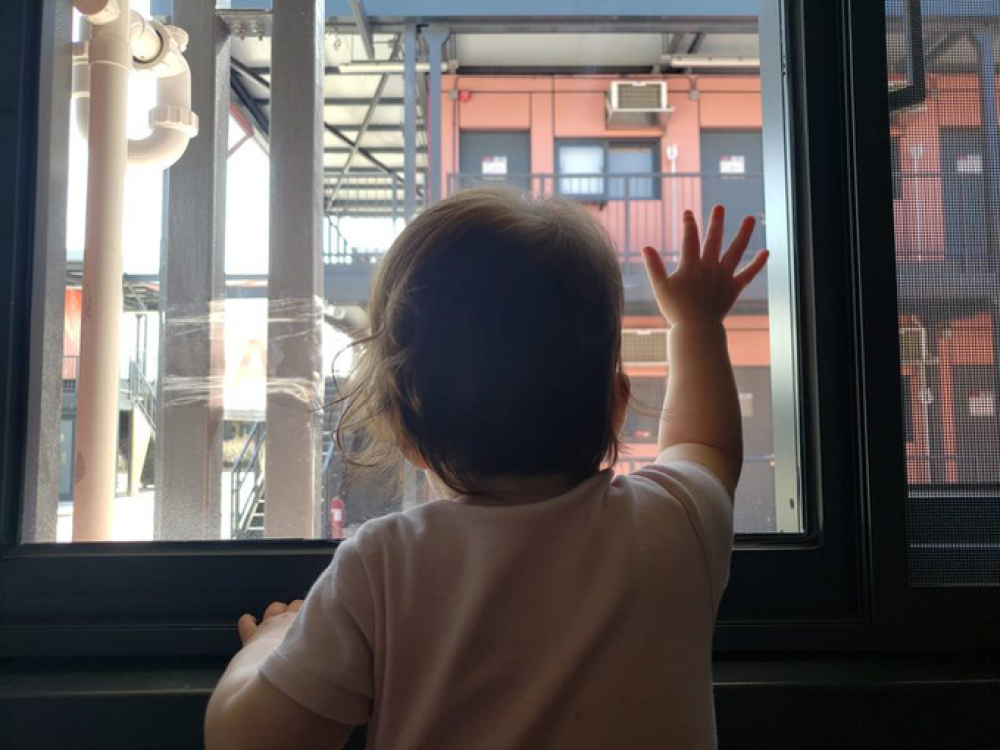Thanks to its tough border controls, until the outbreak of the Omicron variant, Hong Kong reported virtually no local Covid-19 cases for six months. Urging the government to introduce a vaccine pass by March 2022 to pave the way for the reopening of the city’s borders, microbiologists Yuen Kwok-yung, David Christopher Lung and Ivan Hung Fan-ngai of The University of Hong Kong explain its significance and what to expect on the road to reopening Hong Kong.
Yearning to breathe free: Under Hong Kong’s onerous quarantine rules, arrivals from high-risk countries and traced contacts of the infected do time in the Penny’s Bay camp on outlying Lantau Island (Credit: Gary Rickard @The_Spud on Twitter)
Hong Kong has one of the world’s toughest border control regimes against Covid-19. Inbound travelers from most cities are required to spend 21 days in quarantine at government centers or designated hotels. But the reality is that SARS-CoV-2 is here to stay. Our current strategy is not a viable long-term option.
Until the outbreak of the Omicron variant, Hong Kong had nearly zero cases for six months. While Omicron cases have emerged in the community, we should use this window strategically to prepare the city to open up to mainland China and the rest of the world. We need to open up to survive and compete as an international city, and the government can do this by learning from Israel and Singapore to install a vaccine pass system to raise the vaccination rates to nearly 100 percent.
As long as most of us have been inoculated or naturally infected, despite seeing a surge after the reopening, the proportion of severe cases will be markedly reduced, and we will not be overloading our emergency rooms (as happened during the winter seasonal influenza surge) and intensive care units (ICUs), hence preventing the public healthcare system from collapsing. .
If the government acts now to introduce a vaccine pass system requiring at least two vaccine doses by March, Hong Kong can hope to reopen to the world by summer 2022.
Most importantly, the city has imposed very stringent border control, requiring 21 days of quarantine for travelers and returnees from high-risk places. Hong Kong has never imposed a complete lockdown or whole-population testing, but we succeeded in achieving zero-case status for more than six months. Citizens have largely resumed most of their daily activities, yet there is a price to pay. Because of its tough travel restrictions, Hong Kong has fallen in Bloomberg’s Covid-19 resilience ranking (the “best and worst places to be during the pandemic”) from 10th in May 2021 to 24th in December last year.
Our vaccination rate has also plateaued, staying at around 70 percent, while other places have achieved much higher rates, with Beijing at more than 95 percent, the UK 85 percent, and Singapore 85 percent. The earlier we can achieve 99 percent immunity, the faster Hong Kong can reopen to the world. The elderly are our priority; they must all be vaccinated.
Can we really continue to achieve zero transmission in Hong Kong without affecting our freedom to travel for business and pleasure and without hurting our psycho-social health and economy?
As the Chinese saying goes, “a prolonged defense strategy always leads to defeat.” Vaccines only reduce symptomatic disease, hospitalization and death, but they do not prevent infections or transmissions. Before Omicron, those who were fully vaccinated with mRNA vaccines were two-thirds less likely than unvaccinated people to harbor SARS-CoV-2. Furthermore, the rate of transmission among fully vaccinated households was 11 percent, compared to 22 percent among unvaccinated households. In an study in England of 151,821 contacts of 99,567 index patients, the rate of transmission from people fully vaccinated with Pfizer-BioNTech (BNT) was 23 percent, compared to the 49 percent transmission rate of unvaccinated people.
Even vaccinated elderly, especially those inoculated with an inactivated vaccine, could still die from Covid-19 because full protection may not be possible. Thus, every member of nursing homes should exercise their civic responsibility to fellow residents and be fully vaccinated by March 2022. For those who are unvaccinated without a valid medical reason, they should undergo a weekly self-financed RT-PCR test. While the apprehension of the elderly getting vaccinated is understandable, this fear is simply unfounded.
We should also vaccinate all children (and all members of households with elderly) to prevent them from infecting the seniors, as often happens with the seasonal flu. School outbreaks have been reported in the UK and Singapore as many children and adolescents have yet to receive or have just received approval for vaccination. Their parents may also be reluctant to allow them to get vaccinated due to the fear of vaccine-induced myocarditis, the risk of which can be minimized if the vaccine is given intramuscularly at the thigh, or if they receive an inactivated vaccine, such as Sinovac.
The US Federal Drug Administration (FDA) has approved the use of the BNT vaccine in children and adolescent aged five to 11 years old, when the dose is reduced to a third of that for adults. The risk of myocarditis is, therefore, further reduced. Hong Kong currently recommends adults to receive BNT as the booster dose to prepare for the impending threat of Omicron, where the recommendation on a third dose in children and adolescent is yet to come. Sinovac is expected to develop new vaccines targeting the Omicron variant, hopefully giving parents a second option.
While the antiviral drug Molnupiravir could benefit Covid-19 patients who are unvaccinated due to major underlying illnesses or old age, a study revealed that it only has a relative risk reduction of 30 percent, compared to 67 to 95 percent for Covid-19 vaccines. Moreover, Molnupiravir has been shown to be mutagenic in animal studies and should be avoided in pregnant individuals. Another antiviral, Nirmatrelvir, belonging to the protease inhibitor group, has also recently been approved for use. Although the drug can also reduce the risk of hospitalization and death, it is not without side effects and can interact with other drugs.
Ultimately, the benefit and expenses of vaccination to prevent severe death markedly outweigh the risks. Indeed, if most of the population are fully vaccinated, the Omicron variant can essentially be a good natural intra-nasal vaccine that may boost the airway mucosal immunity of the healthy population with no underlying diseases.
If the Hong Kong government could implement a vaccine pass system in March 2022, Hong Kong could gradually open up to the international community by May, when more than 90 percent of our eligible population would have received two doses of Covid-19 vaccine.
Initially, incomers should be fully vaccinated, undergo antibody testing to ascertain immune status and test negative for Covid-19 by RT-PCR for three times within the first 48 hours of quarantine. They should then be allowed to choose between going home or staying in a designated hotel with daily or alternate-day testing at their own expense for the remaining 19 days. Their movements should be restricted to between their homes or the hotels, workplaces and designated eating facilities at their hotels. If they want to move around, they must be tracked for 21 days by enhanced devices in case a contact tracing operation is required.
By July 2022, when 99 percent of the eligible population have been vaccinated with at least two doses of the Covid-19 vaccine, it would be safe for Hong Kong to open up to both the mainland and to overseas visitors. Virus transmission is less efficient in the higher temperatures of the summer and the body’s reaction to infection is usually less severe.
The recently emerged variant Omicron seems to be causing more infection, yet less severity compared to Delta variant. Analysis in Denmark of more than 785 cases of Omicron showed a similar rate of hospitalization and severe cases, while recent UK studies have established that the risk of presentation to emergency care or hospital admission with Omicron is less than with Delta. Animal studies have also demonstrated that Omicron causes less damage to the lungs. Although in-vitro analysis indicates Omicron strains can still evade antibodies after two doses of mRNA vaccine, a third dose retains its ability to neutralize the variant.
Despite being more contagious, the Omicron virus appears less virulent than past Covid-19 variants and could well be a blessing in disguise. The opportunity to reopen Hong Kong borders and return to normalcy before Christmas 2022 is here. Hong Kong should seize it.
Further reading:
Yuen Kwok-yung
The University of Hong Kong
David Christopher Lung
The University of Hong Kong
Ivan Hung Fan-ngai
The University of Hong Kong
Check out here for more research and analysis from Asian perspectives.







